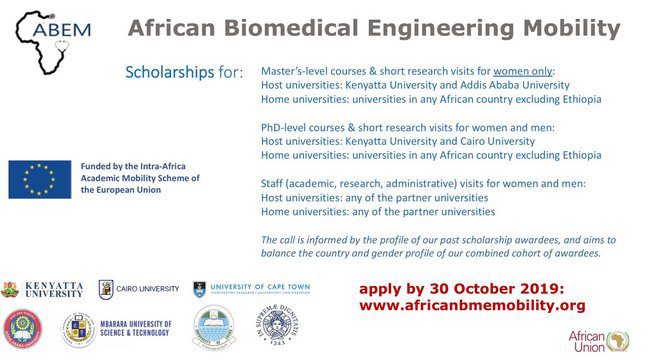Application Deadline: October 30th 2019
The African Biomedical Engineering Mobility (ABEM) project is funded by the Intra-Africa Academic Mobility Scheme of the Education, Audiovisual and Culture Executive Agency of the European Commission. The scheme is modelled on Europe’s well-established and successful Erasmus-Mundus programme. As part of the Roadmap 2014-2017 of the Joint Africa-EU Strategy, the Intra-Africa Mobility Scheme underlines the contribution of higher education towards economic and social development and the potential of academic mobility to improve the quality of higher education.
ABEM will build human and institutional capacity in Africa for needs-based health technology research and development. The project will train postgraduate students with skills and specialisations not offered at their home institutions. Furthermore, it will support the development of biomedical engineering programmes that are being established, or have recently been established, at partner institutions and contribute toward harmonising biomedical engineering curricula across the continent. This will be achieved through the provision of scholarships to cover the full cost of mobility between African higher education institutions.
Overall, the project will enhance employment opportunities for graduates, enhance staff research profiles and teaching competencies, enhance institutional research profiles and inter-university cooperation, and support the development of solutions for health challenges from an African perspective.
ABEM will train up to 32 MSc and 10 PhD graduates, and offer development opportunities to up to 10 staff members.
Mobility must be to an institution in an eligible country other than the home country / country of the home institution.
Target groups and types of mobility
There are two target groups and three different types of individual mobility:
| Participants | Mobility types | Duration | |
| Target group 1 | Students registered in or having obtained a degree from one of the six African partner institutions | Master’s Doctorate | 6-24 months 6-48 months |
| Staff working in or associated with one of six African partner institutions | Visits for teaching and/or research, or for engagement on administration and management | 1 – 6 months | |
| Target group 2 | Students registered in or having obtained a degree from a higher education institution not included in the partnership but established in an eligible country (see below) | Master’s Doctorate | 6-24 months 6-48 months |
The eligible countries are presented in the table below:
| Regions of Africa | Countries |
| Central | Burundi, Cameroon, Central African Republic, Chad, Congo, Congo (DRC), Equatorial Guinea, Gabon and São Tomé and Principe |
| Eastern | Comoros, Djibouti, Eritrea, Ethiopia, Kenya, Madagascar, Mauritius, Rwanda, Seychelles, Somalia, Sudan, South Sudan, Uganda and Tanzania |
| Northern | Algeria, Egypt, Libya, Tunisia and Morocco |
| Southern | Angola, Botswana, Lesotho, Malawi, Mozambique, Namibia, South Africa, Swaziland, Zambia and Zimbabwe |
| Western | Benin, Burkina Faso, Ivory Coast, Cape Verde, Gambia, Ghana, Guinea, Guinea- Bissau, Liberia, Mali, Mauritania, Niger, Nigeria, Senegal, Sierra Leone and Togo |
Master’s and doctoral students may undertake:
- Credit-seeking mobility of 6 to 12 months at a partner institution, leading to academic recognition of the study period towards a degree programme at the home institution,
- Degree-seeking mobility to complete a full degree at a partner institution. The project aims for 50% of students and at least 30% of staff who participate in mobility visits to be women.
PLEASE NOTE: PhD full degree-seeking mobility is no longer available
Application process
Preparation
The applicant should:
- Verify the eligibility criteria (if a candidate does not fulfil all of the eligibility criteria, he/she should not submit an application, as the application will be considered invalid and will not be evaluated).
- Identify the Target Group to which (s)he belongs and the available scholarships.
- Select at least one host institution. It is highly recommended that applicants select up to 3 different host institutions from the available options but always with consideration to language and background requirements defined by each host institution and programme.
- Create an account on the application website for the project.
- Read attentively the Guidelines for Applicants, the FAQs and the online Application Form.
- Collect all necessary information and documents to complete the Application Form:
Several documents are mandatory and the online system will not allow the application to be submitted without them. In case of unreadable documents, the application will be considered invalid and will not be evaluated. - Select the host institution(s) with consideration to the following:
- The language requirements of the host institution.
- The identified areas of excellence and available projects in each partner institution.
- The required academic background for the field of study, research project or activity.
- The cost of living at prospective host institutions, personal needs for subsistence, and the monthly stipend for the scholarship.
- The need to adapt to different cultural realities at the hosts institution and also to different climate conditions, in case of selection
- Prepare a mobility project proposal describing the aims, activities and foreseen study/work plan and taking into consideration the objectives and goals of the host programme and of the ABEM project. The proposal must be clear in its methodology, impact and benefit, as well as its feasibility within the time-frame established by the duration of the scholarship. Staff should liaise with the home and host universities on the programme of activities, eg lectures or administrative work to be delivered; research activities to be carried out; type of training to be followed; etc.
- Prepare a motivation with regard to the benefits and expected outcomes of the mobility
For More Information:
Visit the Official Webpage of the African Biomedical Engineering Mobility (ABEM) Scholarships 2020

